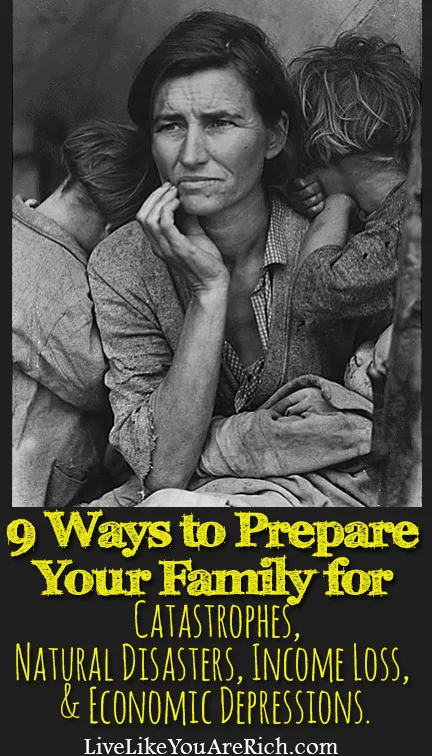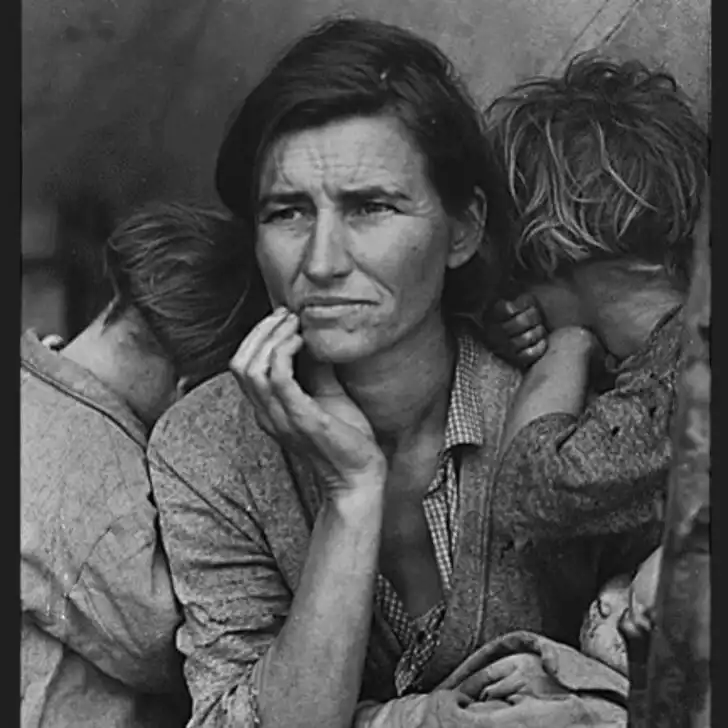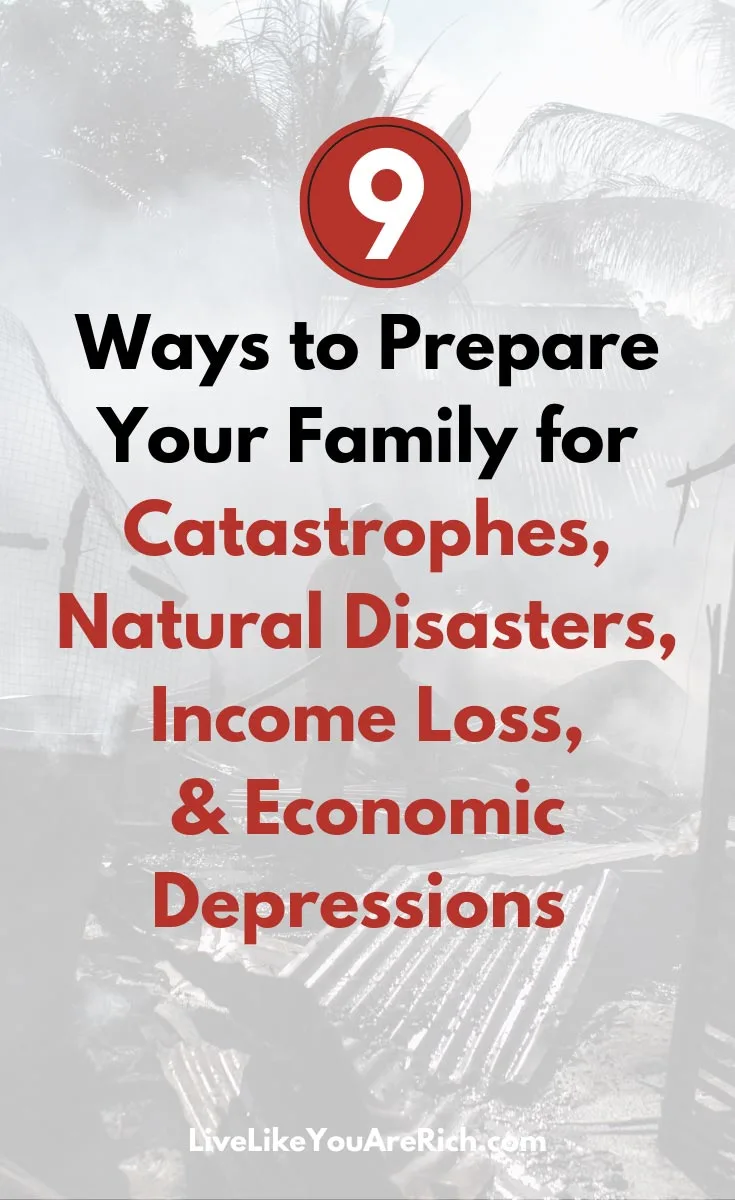Side note- I published this post a few years ago. With the current health emergency situation, I am republishing it to help readers prepare on how to survive through potential emergency disasters.
I just got off the phone with my grandpa. He is a very humble and kind man, the type of man everyone just loves to sit and chat with for hours. He has a great sense of humor and loves to tell me stories. Today one of his stories had to do with his memories of the Great Depression. My grandparents were just kids when it happened but my grandpa remembers it vividly.
He told me about how sad it was to see so many people lined up for soup. He said the lines were really really long. He said that people would often come knocking on his parents’ door begging for food. His mother always fed those that came. His family, he said, was prepared in many ways for the Great Depression. Further, they worked really hard during it. As a result, they were able to keep their home, stay fed, and made it through the very difficult years without losing everything, as an unfortunate many did.
Then my grandpa reminded me of when in 2008 the stock market nearly crashed and the housing market tanked. Thousands, even millions of US citizens were out of work and lost their homes. We have a summer home in a small town and the community got hit really hard. It was a thriving little town and now it has become a little more than a ghost town. It’s really sad for me to drive down the main street and see a lot of the vacant, run down buildings where businesses used to thrive.
Many cities and towns were hit hard in America and unfortunately, things haven’t changed as they did after the Great Depression. My grandpa told me to prepare and do everything I can to make sure my family can withstand a crisis like he has seen come to too many women, children, and men.
I think there is a lot that can be learned from history and I certainly want to be as prepared as possible. So I asked my grandpa, “How can I be prepared to get through an economic depression if another were to hit America?”
Here are some tips he gave me. I’ve also added a few extra details that I know are important from further research.
1. Get out of debt. Do your very best to get out of debt as soon as possible.
2. Start or keep building up savings. The book I co-wrote talks in depth about how to build savings. You should be saving 10% of your income. If you can’t afford 10% start off with as much as possible. Don’t touch the savings either until you have enough to account for 3 full months of living expenditures. After that, you can use the rest for investments.
3. Build food and water storage. You should have extra food and store water in your home/storage areas. Aim to accumulate at least enough to last your family for 3 months. Most resources I have read suggest having basic food staples (wheat, rice, oats, beans, powdered milk, etc.) to last one year. If you learn to coupon, you can begin stocking up on food and start building your storage without too much extra expense. Here is a beginner’s guide to couponing.
4. Protect yourself financially. My grandpa and my dad have been telling my siblings and I that the safest places to put your money are in precious metals, real estate (if you can afford it), and other safe investments.
After your consumer debt is paid off (if you have any), but before your home is paid off, start acquiring precious metals. My grandpa illustrated that since Jesus was betrayed by 30 ounces of silver we know that they used silver back in the B.C. days. Even today silver and gold are legal tenders. Further, they can be easily sold and used for trading. He said that when you need cash you can sell silver and gold in a matter of minutes. If/when cash is no longer strong, silver and gold will be great ways to buy things or trade with. Commodities and necessities also trade very well. He told me to diversify. The common saying is correct, “Don’t put all your eggs in one basket”. Silver and gold can bail a person out when they need cash quickly. During a long-term depression often food and other necessities are more easily traded.
If you haven’t already gotten started accumulating precious metals a great place to buy is on Amazon.com. Here are some silver coins you could buy there as well. Even buying one silver coin every week or two (they range from $20-$40 each) will get you started on building up a good supply.
My dad used to tell me that affordable housing will always be a necessity. So if you can purchase real estate to rent out or turn an unused portion of your home, garage, or property into a rental unit, that is a great way to get more financially secure as well.
5. Learn how to garden. The quality of American food is declining while prices are simultaneously rising. Learning how to garden and grow your own veggies and fruit are great skills to have at any time, but especially during hard times. In addition, raising chickens for eggs and meat are also important skills. I love to watch documentaries on Netflix. Many of them are about how people live off of the land in Alaska and other wilderness areas. I’ve noticed that most everyone seems to raise chickens and turkeys. And figured out that it’s mainly because they give or are a great source of lean protein. Further, home-raised chickens don’t have the hormones that are in most store bought eggs and meat.
6. Get armed and protected. It’s important either for protection or for food/gathering to have a gun. I recommend owning at least one. Shot guns are great (especially for hunting birds and protection) but a handgun works as well.
7. Learn how to be frugal. There are so many ways to save money. Often we spend more just for convenience. Subscribe to my blog to learn more frugal and money saving tips. Don’t get overwhelmed if you feel like there is too much to learn. I co-wrote this book with a financial wiz. There are many step-by-step ways to becoming frugal if you aren’t sure how (or if you want to get better at it). There is a saying that I love, “By small and simple things are great things come to pass”. Saving a little here and there really does add up. The book I co-wrote talks in depth about this principal.
8. Learn how to fix and repair things (AND teach your children). Growing up, I honestly thought we were poor. My dad and mom had very long lists of chores we had to get done each day. Saturdays were PROJECT days. We learned how to tile, hang sheet rock, perfatape, re-shingle a roof, fix plumbing problems, fix sprinklers, do laundry correctly, and many other skills. I thought we had to do all of these things ourselves because we were poor. I have since learned that my parents were teaching us vital life lessons and skills. These would enable us to fix things, be more self-sufficient, save money, and most of all, empower us with a life long and vital work ethic. Prepare your family by teaching them skills and making them learn how to work hard.
9. Have a 72 hour kit. Some times when people lose shelter and have no food it isn’t brought on by depression but by a natural disaster. Usually, in these situations relief does come, but it is not immediate. Having a good 72 hour kit that is kept near the door or in the car is a great way to prepare for desperate times. Click here for a post that has been very popular about 72 hour and car emergency kits.
Doing these 9 steps will not only help your family survive through a potential Great Depression, but also through job loss, other catastrophes, and even natural disasters.
For more ‘living rich’ tips please subscribe, follow me on Facebook, on Pinterest and Instagram.

Photo courtesy of the National Archives and Records Administration.




4 Ways To Prepare For Natural Disaster And Economic Depression | DIY Home Things
Saturday 8th of November 2014
[…] 4 Ways To Prepare For Natural Disaster And Economic Depression […]
Amy
Saturday 16th of August 2014
Great article! I seriously love your blog, you really seem to know your stuff. You wrote "My grandpa and my dad have been telling my siblings and I that the safest places to put your money are in precious metals....". Do you have any precious metal companies you would recommend? I always see and hear commercials for buying gold coins and such and I don't know which company is the best. Do you (or your dad or grandpa) recommend coins or bars?
Amy
Saturday 16th of August 2014
Ok I just realized as I read further down that you already kind of answered me lol. Sorry.
9 Ways to Prepare Your Family for Catastrophes, Natural Disasters, Income Loss, and Economic Depressions
Sunday 3rd of August 2014
[…] Doing these 9 steps will not only help your family survive through a potential Great Depression, but also through job loss, other catastrophes, and even natural disasters. Source […]
Dee dee
Monday 14th of April 2014
I agree with everything on this list. Make sure you have enough food items to take care of your family and things to barter with if you are preparing for economic chaos. If you are wanting something to invest in...invest in land. My grandpa always said, "buy land..that is the one thing The Lord is not making more of." If you want good ideas, no matter what you might think of their religion, the Mormons have been telling their people for more than 100 years to have a years supply of food, water, etc. Check our their webpages for ideas.
Anita Fowler
Monday 14th of April 2014
Dee dee- Yes the Mormon (Church of Jesus Christ of Latter-Day Saints) are the champions of having a good supply of food, water, and being prepared. Their/our resources are wonderful. Agreed! Great ideas. Thanks for the comment!
Marlin
Thursday 3rd of April 2014
I grew up in a very frugal family. We grew our food in the garden. And used what we have until we cant really use it anymore like clothes we wore it out until there is a hole in it. Very helpful tips. I need to stock up my pantry food !
Anita Fowler
Thursday 3rd of April 2014
Marlin- Thanks for the comment. What a great way to be raised! Yes my parents did similar things. I totally thought we were poor (It wasn't until I was older that I realized my dad was a millionaire) but he made us work and work hard! Your parents must have understood the importance of working hard and being prepared. Thanks!